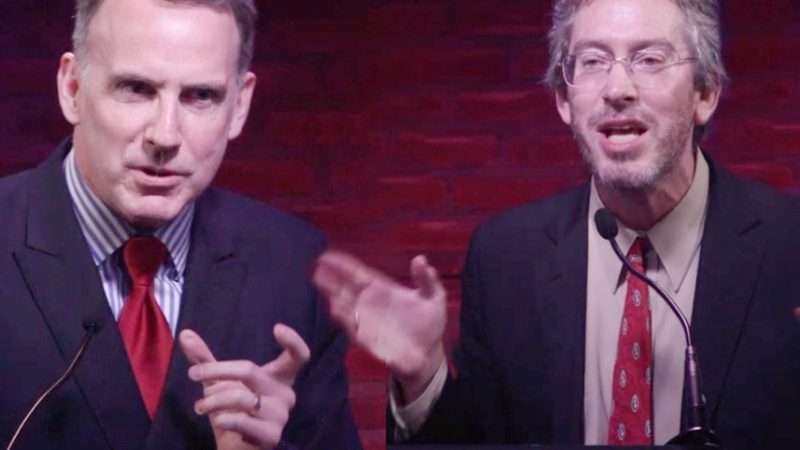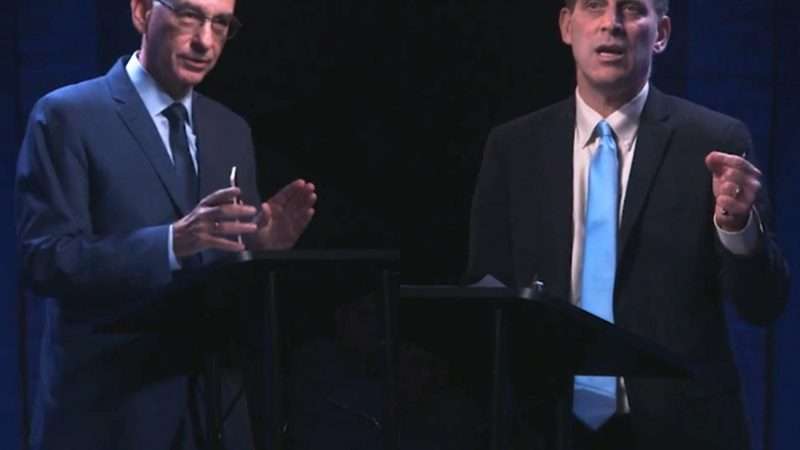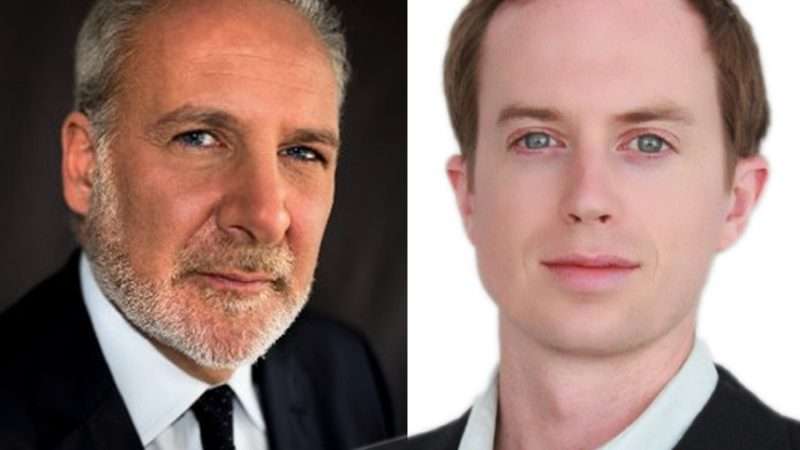
The Soho Forum Debates
The Soho Forum Debates
All episodes
Best episodes
Top 10 The Soho Forum Debates Episodes
Goodpods has curated a list of the 10 best The Soho Forum Debates episodes, ranked by the number of listens and likes each episode have garnered from our listeners. If you are listening to The Soho Forum Debates for the first time, there's no better place to start than with one of these standout episodes. If you are a fan of the show, vote for your favorite The Soho Forum Debates episode by adding your comments to the episode page.

Would More Gun Control Lead to More Crime? A Debate
The Soho Forum Debates
09/24/18 • 81 min
Does defensive gun use stop crime? Would more gun control save lives? Those were the topics of a public debate recently hosted by the Soho Forum, featuring Gary Kleck, a criminologist from Florida State University, and Paul Helmke, the former president and CEO of the Brady Center/Brady Campaign to Prevent Gun Violence as well as the former mayor of Fort Wayne, Indiana.
Kleck argued that there are at least four times as many defensive gun uses by potential victims as there are by criminals, and that new gun controls would reduce the defensive uses far more than the criminal ones. Helmke questioned Kleck's take on the data.
The debate was held on September 13, 2018, at the SubCulture Theater in Manhattan's East Village. Soho Forum Director Gene Epstein moderated. Comedian Dave Smith, host of the podcast Part of the Problem, was the opening act.
The full resolution read: While laws that prohibit gun ownership would reduce crimes perpetrated by criminals, that benefit would be more than offset by the foregone opportunities for defensive gun use by victims of crime.
It was an Oxford-style debate in which the audience votes on the resolution at the beginning and end of the event, and the side that gains the most ground is victorious. Kleck, arguing the affirmative, prevailed by convincing about six percent of audience members to change their minds.
All Soho Forums are turned into Reason videos and podcasts. Go here for a full archive.
Kleck's research has focused on the impact of firearms and gun control on violence, deterrence, and crime control. He is the author of Point Blank: Guns and Violence in America, which won the 1993 Michael J. Hindelang Award of the American Society of Criminology. He also wrote Targeting Guns (1997) and, with Don B. Kates, Jr., The Great American Gun Debate (1997) and Armed (2001), and, with Brion Sever, Punishment and Crime (2017).
Helmke is a professor of practice at Indiana University's School of Public and Environmental Affairs, and he is the founding director of the Civic Leaders Living-Learning Center in Bloomington, IN.
Edited by Todd Krainin.
"Modum" by Kai Engle is licensed under a CC-BY creative commons license.
Subscribe to our YouTube channel.
Subscribe to our podcast at iTunes.
The post Would More Gun Control Lead to More Crime? A Debate appeared first on Reason.com.

Can the Free Market End Global Poverty? Nobel Laureate Joseph Stiglitz vs. NYU's William Easterly
The Soho Forum Debates
09/13/18 • 87 min
There has been a staggering reduction in global poverty over the last four decades. In China, sustained rates of economic growth have lifted 800 million people out of extreme poverty. Ethiopia, a country once synonymous with famine, has grown faster than China while nearly halving its poverty rate over the last 15 years. Across the planet, developing countries large and small, from India to Ghana, have seen astonishing successes in alleviating poverty, exceeding even the most optimistic economic forecasts.
How did this extraordinary shift happen? Do poor countries need more markets, or more government?
Two of the world's best-known development economists, Joseph Stiglitz and William Easterly, met on August 27, 2018, at the SubCulture Theater in Manhattan's East Village to debate these questions. The event was sponsored by the Soho Forum, a monthly debate series partnered with Reason. Soho Forum Director Gene Epstein moderated.
Stiglitz, a Nobel laureate and former chief economist of the World Bank, is a professor at Columbia University. He credits thoughtful and aggressive government intervention for the rising fortunes of China and Ethiopia. In his view, markets are a tool to stimulate economic growth—but not always the most effetive one. "You always are going to have a mixture of governments and markets," he says. "And the only success is going to be where you get the right mixture."
Easterly is a professor of economics at New York University and a senior fellow at the Brookings Institution. He argues that China only achieved stellar growth rates after the Communist Party started to recede from economic life and created a space for markets to thrive. Likewise, Ethiopia prospered only after the disintegration of a repressive Communist regime, known as the Derg, paved the way for widespread privatization of industry and commerce.
Produced by Todd Krainin.
Visit the archive of past Soho Forum events.
To listen to an audio podcast version of the Soho Forum, subscribe to the Reason Podcast at iTunes.
Subscribe to our YouTube channel.
The post Can the Free Market End Global Poverty? Nobel Laureate Joseph Stiglitz vs. NYU's William Easterly appeared first on Reason.com.

Should Facebook and Twitter Censor Themselves? A Debate.
The Soho Forum Debates
11/16/18 • 86 min
Should social media platforms like Facebook, Twitter, and YouTube only remove users who make true threats or incite violence? Or do they have an ethical obligation to hold their users to a higher standard?
That was the topic of a recent public debate hosted by Reason—a West Coast version of the popular New York City-based debate series, The Soho Forum—pitting Thaddeus Russell, author of A Renegade History of the United States and host of the Unregistered podcast, against Ken White, an attorney at Brown, White & Osborn, author at the legal blog Popehat, and co-host of the podcast All the President's Lawyers.
Russell argued that corporations that accept tax breaks and public subsidies should be more accountable to the public. White held that social media sites deserve the same set of speech rights and limitations as ordinary citizens.
Both speakers agreed with the broader libertarian point that private websites have the legal right to do what they want. The debate hinged on a broader point: What should the culture of free speech, free expression, and ownership look like on our social media platforms?
It was an Oxford-style debate, in which the audience votes on the resolution before and after the event, and the side that picks up the most votes wins. White won the debate by picking up 20 percent of the votes.
The debate was held on November 1, 2018, at Reason's Los Angeles studio.
Edited by Ian Keyser. Recording by Meredith Bragg, Paul Detrick, and Zach Weissmueller.
'Machinery' by Kai Engel is licenced under CC BY-NC 4.0
Subscribe to our YouTube channel.
Subscribe to our podcast at iTunes.
The post Should Facebook and Twitter Censor Themselves? A Debate. appeared first on Reason.com.

Is There a 'Rape Culture' on College Campuses? Watch the Debate.
The Soho Forum Debates
04/04/18 • 97 min

Social Media Censorship and The First Amendment
The Soho Forum Debates
12/22/23 • 91 min
Should the federal government be able to "urge," "encourage," "pressure," or "induce" social media companies into censoring free speech about COVID-19? A recent ruling in federal court said no. That ruling is the subject of this month's Soho Forum Debate between law professor Kate Klonick and professor of medicine Dr. Jay Bhattacharya. The resolution is: "The making of national internet policy was hindered, rather than helped, by the July 4th federal court ruling that restricted the Biden administration's communications with social media platforms."
Arguing for the affirmative is Kate Klonick, an associate professor at St. John's University Law School, a fellow at the Brookings Institution, and a distinguished scholar at the Institute for Humane Studies. Her writing has appeared in the Harvard Law Review, Yale Law Journal, The New Yorker, The New York Times , The Atlantic, The Washington Post, and numerous other publications.
Arguing against the resolution is Jay Bhattacharya, M.D. Ph.D., a professor of medicine at Stanford University. He is a research associate at the National Bureau of Economics Research, as well as a senior fellow at the Stanford Institute for Economic Policy Research and at the Stanford Freeman Spogli Institute for International Studies. His research focuses on the economics of health care around the world with a particular emphasis on the health and well-being of vulnerable populations. His peer-reviewed research has been published in economics, statistics, legal, medical, public health, and health policy journals. Dr. Bhattacharya was one of three main co-signatories of the Great Barrington Declaration of October 2020, an open letter published in response to the COVID-19 pandemic and lockdowns.
The post Social Media Censorship and The First Amendment appeared first on Reason.com.

Resolved: The Government Should Cut Off All Funding to Colleges and Universities.
The Soho Forum Debates
05/24/18 • 92 min

Should all government funding of higher education be abolished?
On May 14, 2018, that provocative resolution was debated by economists Edward Glaeser and Bryan Caplan, author of the new book, The Case Against Education: Why the Education System is a Waste of Time and Money. Two main arguments dominated the discussion. First, was the humanistic question: Is government support needed to foster new ideas and cultural expression? Second, the economics of the matter: Does the hundreds of billions in annual government funding to American universities and colleges benefit the country by boosting the earnings and productivity of its citizens?
Caplan is a professor of economics at George Mason University, research fellow at the Mercatus Center, and adjunct scholar at the Cato Institute. His other books include The Myth of the Rational Voter and Selfish Reasons to Have More Kids: Why Being a Great Parent is Less Work and More Fun Than You Think. He holds a Ph.D. in economics from Princeton University.
Edward Glaeser argued against the resolution. A professor of economics at Harvard University, where he has taught since 1992, Glaeser has served as director of the Taubman Center for State and Local Government, and director of the Rappaport Institute for Greater Boston. His academic work has focused on zoning, housing policy, and urbanism, and he's the author of the 2012 book Triumph of the City: How Our Greatest Invention Makes Us Richer, Smarter, Greener, Healthier, and Happier.
The Soho Forum, which Reason sponsors, is a monthly Oxford-style debate, meaning that the audience votes before and after the proceedings, and the debater who has moved the most people prevails. In this case, Caplan won by convincing 12 percent of the audience to switch over to his side.
The opening act was comedian Dave Smith, host of the podcast Part of the Problem.
Visit the archive of past Soho Forum events.
Next month, watch law professors Randy Barnett and Michael Dorf debate the following resolution: "The U.S. Constitution should be interpreted and applied according to the original meaning communicated to the public by the words of the text." The debates are held at the SubCulture Theater in Manhattan's East Village. Tickets here.
To listen to ...

Socialism vs. Capitalism: Jacobin's Bhaskar Sunkara and Economist Gene Epstein Debate
The Soho Forum Debates
10/25/18 • 105 min
Is socialism more effective than capitalism in bringing freedom to the masses?
That was the resolution at a recent public debated hosted by the Soho Forum on October 15, 2018. It featured Bhaskar Sunkara, the founding editor and publisher of Jacobin magazine, and Gene Epstein, the Soho Forum's director and former economics and books editor of Barron's. Naomi Brockwell moderated.
It was an Oxford-style debate in which the audience votes on the resolution at the beginning and end of the event, and the side that gains the most ground is victorious. Epstein, arguing the negative, prevailed by convincing about 11 percent of audience members to change their minds.
Sunkara is also the author of the forthcoming The Socialist Manifesto: The Case for Radical Politics in an Era of Extreme Inequality, which will be published by Basic Books in 2019.
Comedian Dave Smith, host of the podcast Part of the Problem, opened the program.
The Soho Forum, which is partnered with the Reason Foundation, is a monthly debate series at the SubCulture Theater in Manhattan's East Village. At the next debate, which will be held on November 14, 2018, Columbia professor John McWhorter will debate NYU's Nikhil Pal Singh on whether "the message of anti-racism has become as harmful a force in American life as racism itself." Buy tickets here.
Music: "January" by Kai Engle is licensed under a CC-BY creative commons license.
All Soho Forums are turned into Reason videos and podcasts. Go here for a full archive.
Subscribe to our YouTube channel.
Subscribe to our podcast at iTunes.
The post Socialism vs. Capitalism: <em>Jacobin's</em> Bhaskar Sunkara and Economist Gene Epstein Debate appeared first on Reason.com.

Has the U.S. Constitution Lost Its Meaning? A Debate
The Soho Forum Debates
06/22/18 • 91 min

Should the U.S. Constitution be interpreted and applied according to the original meaning of its text?
On June 11, 2018, two leading constitutional legal scholars, Georgetown's Randy Barnett and Cornell's Michael Dorf, debated "originalism," which seeks to protect against arbitrary and personal interpretations by jurists, while making the law stable, predictable, and consistent in its application.
The debate was hosted by Reason and the Soho Forum, which runs Oxford-style debates, in which the audience votes on the resolution at the beginning and end of the event, and the side that gains more ground is victorious. The resolution was: "The U.S. Constitution should be interpreted and applied according to the original meaning communicated to the public by the words of the text."
Dorf won the debate by changing the minds of 20 percent of the attendees.
Barnett, arguing for the affirmative, is the Carmack Waterhouse Professor of Legal Theory at the Georgetown University Law Center and the director of the Georgetown Center for the Constitution. His books include Our Republican Constitution: Securing the Liberty and Sovereignty of We the People and Restoring the Lost Constitution: The Presumption of Liberty. After taking a J.D. from Harvard Law School, he worked as a prosecutor in Chicago. Barnett is a Senior Fellow of the Cato Institute and the Goldwater Institute.
Dorf, for the negative, is the Robert S. Stevens Professor of Law at Cornell University Law School. He is the editor, author, or co-author of six books, including On Reading the Constitution, with co-author Laurence Tribe. Since 2000, Dorf has written a bi-weekly column, currently appearing on Justia's Verdict. He also posts less formal legal analysis several times per week on his blog, Dorf on Law. After taking a JD from Harvard Law School, he served as a law clerk for Judge Stephen Reinhardt of the United States Court of Appeals for the Ninth Circuit and then for Justice Anthony Kennedy of the Supreme Court of the United States.
The event opened with a standup routine from comedian Dave Smith.
The Soho Forum is held every month at the SubCulture Theater in Manhattan's East Village. The next debate, which is sold out, features Erik Voorhees and Peter Schiff on bitcoin and crypotcurrency. On August 27, William Easterly and Joseph Stigli...

Resolved: 15 Million Americans Would Be Better Off Without Welfare
The Soho Forum Debates
12/20/17 • 84 min

Is Bitcoin the Future of Money? Peter Schiff vs. Erik Voorhees
The Soho Forum Debates
07/19/18 • 82 min

On July 2, 2018, Reason and The Soho Forum hosted a debate between Erik Voorhees, the CEO of ShapeShift, and Peter Schiff, CEO and chief global strategist of Euro Pacific Capital.
The proposition: "Bitcoin, or a similar form of cryptocurrency, will eventually replace governments' fiat money as the preferred medium of exchange."
It was an Oxford-style debate in which the audience votes on the resolution at the beginning and end of the event, and the side that gains the most ground is victorious. Voorhees won by changing the minds of 15 percent of attendees.
The Soho Forum is held every month at the SubCulture Theater in Manhattan's East Village. At the next debate, which will be held on August 27, William Easterly, professor of economics at NYU, and Joseph Stiglitz, a Nobel Prize Winner in economics and professor at Columbia, will discuss whether free markets or government action is the best way to eliminate global poverty. You can buy tickets here.
Produced by Todd Krainin.
Subscribe to our YouTube channel.
Subscribe to our podcast at iTunes.
The post Is Bitcoin the Future of Money? Peter Schiff vs. Erik Voorhees appeared first on Reason.com.
Show more best episodes

Show more best episodes
FAQ
How many episodes does The Soho Forum Debates have?
The Soho Forum Debates currently has 92 episodes available.
What topics does The Soho Forum Debates cover?
The podcast is about News, News Commentary and Podcasts.
What is the most popular episode on The Soho Forum Debates?
The episode title 'Does Bitcoin Have the Potential to Become a Generally Accepted Medium of Exchange?' is the most popular.
What is the average episode length on The Soho Forum Debates?
The average episode length on The Soho Forum Debates is 90 minutes.
How often are episodes of The Soho Forum Debates released?
Episodes of The Soho Forum Debates are typically released every 28 days, 2 hours.
When was the first episode of The Soho Forum Debates?
The first episode of The Soho Forum Debates was released on Jul 12, 2017.
Show more FAQ

Show more FAQ